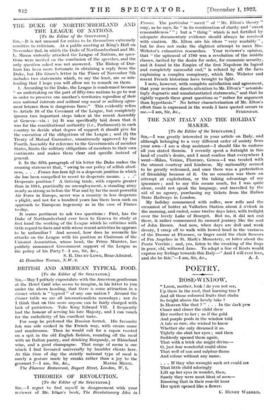THE DUKE OF NORTHUMBERLAND AND THE LEAGUE OF NATIONS.
[To the Editor of the SPECTATOR.] SIR,—It is not unusual for critics to be themselves extremely sensitive to criticism. At a public meeting at King's Hall on November 2nd, in which the Duke of Northumberland and Mr. L. Maxse violently attacked the League of Nations, no ques- tions were invited on the conclusion of the speeches, and the only question asked was not answered. The Bishop of Dur- ham has been more fortunate in obtaining a reply from the Duke, but His Grace's letter in the Times of November 7th includes two statements which, to say the least, are so mis- leading that I hope you will allow me to remark on them.
1. According to the Duke, the League is condemned because " an undertaking on the part of fifty-two nations to go to war in order to preserve one another's territories regardless of their own national interests and without any naval or military agree- ment between them is dangerous farce." This evidently refers to Article 10 of the Covenant of the League, but completely ignores two important steps taken at the recent Assembly at Geneva—viz. : (a) It was specifically laid down that it was for the constitutional authority (i.e., Parliament) in each country to decide what degree of support it should give for the execution of the obligations of the League ; and (b) the Treaty of Mutual Guarantee, unanimously approved by the Fourth Assembly for reference to the Governments of member States, limits the military obligations of members to their own continents and makes them clear and specific instead of general.
2. In the fifth paragraph of his letter the Duke makes the amazing statement that, " owing to our policy of selfish aloof- ness, . . . France has been left in a desperate position in which she has been compelled to resort to desperate means. . . ." Desperate position ? A thriving trade, with exports greater than in 1914, practically no unemployment, a standing army nearly as strong as before the War and by far the most powerful Air Force in Europe, never was a country in less desperate a plight, and not for a hundred years has there been such an approach to European hegemony as in the case of France to-day.
It seems pertinent to ask two questions : First, has the Duke of Northumberland ever been to Geneva to study at first hand the working of the League which he criticizes with little regard to facts and with whose recent activities he appears to be unfamiliar ? And second, how does he reconcile his attacks on the League with his position as Chairman of the Unionist Association, whose head, the Prime Minister, has publicly announced Government support of the League as the policy of his Party ?—I am, Sir, &c.,


























































 Previous page
Previous page